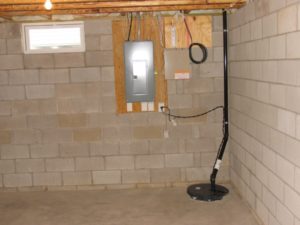The Sump Pump: What Is It? Why Is It Important?
 While a lot of homeowners and renters are vaguely aware of the existence of “sump pumps,” a lot of us aren’t exactly clear on what they are and what they do.
While a lot of homeowners and renters are vaguely aware of the existence of “sump pumps,” a lot of us aren’t exactly clear on what they are and what they do.
The term tends to come up mainly in the context of a sump pump failure, and that lends the entire subject a scary aura. But rest assured, an effective sump pump is a really good thing to have! To learn the fundamentals about what a sump does, why it’s important, and even how to fix basic sump issues, just read on!
Sump pumps come in a range of different types. Some are permanently mounted in your home while others are portable. There are certain fundamentals that are common to all varieties of sump pump.
All sump pumps have the same purpose: They’re intended to prevent flooding by getting rid of any excess water collecting in the lowest level of your home. They also all run on electricity (though some may get that electricity from an independent generator).
Not every home has a sump pump. It’s a good idea to poke around and figure out whether or not you have one BEFORE you have a flood to deal with. If your home has a basement, look for a circular cover set into your floor, a little smaller than a manhole. This is where you’ll find a built-in sump pump if you have one.
Sump pumps can fail for a number of different reasons. One of the most common failures is simply losing access to the electricity the pump needs to run. This can get all too dangerous, because the same sort of extreme weather that might create a flood risk is also likely to knock out your home’s connection to the electrical grid. This is why a battery backup for your sump pump makes a great investment.
Your sump pump might also be knocked out of action by debris buildup. In most cases, you can fix this yourself by cleaning the pump out.
A lot of sump pump designs are triggered by a float switch, not unlike the float in the water tank of a toilet. If the switch breaks or gets jammed, your sump pump might not turn on at the right times. This is another problem that’s usually within most homeowner’s do-it-yourself capabilities.
Another handy preventative investment is a sump pump alarm. This will let you know when your pump starts and stops. It can be a good idea to install one because most pumps are extremely quiet when they’re working and entirely silent when they’re not. You don’t want to wait until your basement starts flooding to find out your sump pump is broken.
A sump pump, like all the other parts of your home’s plumbing system, can develop problems that you don’t feel comfortable or capable of fixing yourself. When you have such a situation, calling in a professional plumber to repair or replace your pump is the right choice. We strongly recommend investing in a battery backup and an alarm for your sump pump; they cost far less than cleaning up an undetected flood caused by a failed sump pump.
If your sump pump is crying out for professional help and it’s located anywhere in the Columbus area, call us 24 hours a day, 7 days a week.
